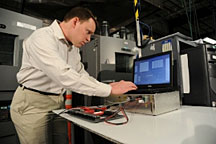- Number 361 |
- April 23, 2012
Tracking advanced vehicle battery health

INL electrical engineer,
IMB inventor Jon Christophersen.
Drivers of traditional cars have a pretty good idea how far they can go on a tank of gas and how long their battery will last. Researchers at DOE's Idaho National Laboratory want to make advanced vehicle batteries just as predictable. One solution is the Impedance Measurement Box (IMB), which offers a quicker, cheaper battery monitor that could lead to more accurate lifetime predictions and doesn't drain the battery during testing, as other methods may.
IBM could contribute to a system that can track the health of hybrid and plug-in hybrid electric car batteries just as a gas gauge lets you know when you're about to run out of fuel. But measuring battery life isn't as simple as checking the gas gauge. Batteries slowly lose their capacity over time, delivering less and less energy with each charge. "It's like a gas tank, but the gas tank is shrinking," Christophersen says.
INL electrical engineer Jon Christophersen collaborated with Montana Tech of the University of Montana and Connecticut-based Qualtech Systems, Inc., to invent the hardware-software solution. IMB rapidly measures the impedance in a battery while it is operating. This has never been achieved before and offers the capability to both assess battery health and the opportunity to establish a new standard for energy storage devices.
An R&D 100 Award recognized it as one of the most innovative inventions of 2011. The electrical industry can use the tool better analyze energy storage systems and improve electrical operations. It has important applications in nearly all battery markets, including electrified transportation for which INL conducts major testing of standards for automakers.
The impact of IMB could be felt quickly as the U.S. military uses equipment requiring more than 500 different batteries, Americans purchase three billion batteries each year and more than 14 million hybrid cars are expected to be sold by 2020.[Nicole Stricker, 208/526-5955,
nicole.stricker@inl.gov]
